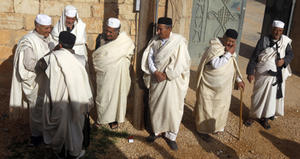Libya updateAnalysis: Support for, opposition to, Gaddafi is tribal in nature
The biggest danger to Col. Gaddafi is not the disorganized rebel forces, not even the destruction of the Libyan air force. Rather, the one thing that will bring him down is the loss of support from the tribal coalition that has kept him in power for four decades; the key to the success of the coalition in its efforts to persuade Gaddafi to abdicate is thus the coalition’s ability to persuade the tribes which have supported Gaddafi so far that they are betting on a losing horse; the tribal support for Gaddafi has thus far held, but high-level defections by members of historically supportive tribe — for example, Libyan Foreign Minister Moussa Koussa and Ali Abdel-Salam al-Treki, former foreign minister who had been representing Libya at the U.N.— may be an indication that the Gaddafi’s tribal coalition is fraying

Members of the influential Warfallah tribe // Source: brookings.edu
The biggest danger to Col. Gaddafi is not the disorganized rebel forces, not even the destruction of the Libyan air force. Rather, the one thing that will bring him down is the loss of support from the tribal coalition that has kept him in power for four decades.
As is the case in many other developing countries, the loyalty of many Libyans is first and foremost to their tribe. Libyans support governments that offer their tribes riches and influence — and which, in addition, suppress rival tribes. If they come to believe that a ruler can no longer guarantee their tribe bug share of the country’s riches, or can no longer effectively control rival tribes, than these Libyans will switch their support to a ruler who can.
The key to the success of the coalition in its efforts to persuade Gaddafi to abdicate is thus the coalition’s ability to persuade the tribes which have supported Gaddafi so far that they are betting on a losing horse.
The leaders of the Western alliance should also be aware of these two facts:
at root, the rebellion against Gaddafi has little to do with democracy, even if some of the rebels are motivated by a desire for a more open society. What we see in Libya is an effort by the tribes which have been on the out for four decades to replace the “in” tribes which, because of their loyalty to Gaddafi, have enjoyed a disproportional share of the spoils.
we do not know what form of governing Libya will have if the rebels do manage to come to power, but two things we know: at least in the short run, the rebels will take revenge on members of tribes supporting Gaddafi (and in that part of the world, revenge means revenge); and we will see a large-scale flight of people from the pro-Gaddafi tribes in the south to neighboring countries, especially Chad (such flight has already began).
Here is a brief analysis of Libya’s tribal make-up.
Gadhadhfa, Warfalla, and Magarha
The Libyan leader relies most on his immediate family and his tribe, the Gadhadhfa. His tribe, though, is a relatively small one among the estimated 140 tribes that predominate life in the North African nation of about six million. He thus vitally needs the support of others, whose allegiance he has bought over the years by handing their members top political and security posts.
Fox News reports that their loyalty is
